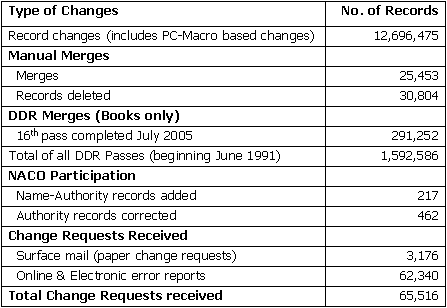
ASSOCIATES (2005, November, v. 12, no. 2) - associates.ucr.edu
*Quality Control Efforts for WorldCat
(the OCLC Online Union Catalog)*
by
Brenda Block
OCLC Quality Control Section Manager
WorldCat is the world’s largest bibliographic database where thousands of OCLC member libraries have contributed over 62 million records since August of 1971. The quality of the WorldCat database continues to be an area of OCLC staff and user attention. High-quality catalog records increase productivity and reduce staffing costs because libraries can accept more records as they are without checking, correcting, and adding missing information to those records.
The quality of such a large bibliographic database is a shared responsibility and requires a cooperative effort among OCLC, the OCLC Regional Service Providers, and users of the WorldCat database.
Quality Control Staff
Currently, the OCLC Quality Control Section (QCS) charged with the responsibility to maintain the quality of the records in the WorldCat database consist of 2 Database Specialist II’s, 3 Database Technicians, and a full-time Section Manager. Together, these six staff members have 100 years of library technical services experience.
In addition to staff within the Quality Control Section, there are several other staff within the division who contribute to the correction of records and/or merging of duplicate records.
The following chart represents statistics compiled by the Quality Control Section of changes and corrections processed by OCLC staff.

PC Macro-based Changes
Before software had the capabilities of using macros, all quality control work was done manually, record-by-record. This process is still used to correct errors on individual records that are reported to us. However, if patterns of errors or changes are identified we make use of macros, which is an efficient way to make repetitive corrections of database errors or changes in subject heading practices, etc. For example, as time permits, an OCLC staff member has changed subfield $x to subfield $v for some form subdivisions, and he has also used the macros to change some obsolete subject headings to the current subject heading forms in accord with current LC subject heading practice. The corrections are not the result of a formal project, but rather represent a manual effort with the assistance of macros in the OCLC cataloging software. For form subdivisions, OCLC staff have made the effort to change only those form subdivisions or likely combinations of form subdivisions appearing at the end of heading strings to avoid incorrectly changing free-floating subdivisions that can be used both as topical and form subdivisions.
DDR Merges
The Duplicate Detection and Resolution (DDR) software that uses a set of algorithms to automatically search and merge books format duplicate records, completed its 16th pass through the WorldCat database in July 2005, merging 291,252 records for a grand total of 1,592,586 merges throughout the years. DDR is currently being rewritten so that it will work with the new Oracle platform.
Change Requests Received
An important part of our quality control efforts comes from the users of the WorldCat database who take the time to send change requests to Quality Control. Users provide photocopies of the item when needed, in order that QC staff can make the appropriate changes to the record in question. This fiscal year, libraries submitted 65,516 error reports including duplicate record reports.
Cooperative Programs
In support of the quality control efforts of the WorldCat database, changes and corrections made to records by the OCLC Regional Service Providers, participants of cooperative programs, and users of the database are represented in the chart below.

CONSER (Cooperative Online Serials)
The number provided for CONSER includes replaces and original inputs of serial records.
Database Enrichments
With Full-mode cataloging authorization or higher, member libraries may enrich records by adding a number of fields to records. See Technical Bulletin 246 for additional information: http://www.oclc.org/support/documentation/worldcat/tb/246/
Examples:
Enhance statistics.
Enhance statistics includes WorldCat Collection Sets, CJK Enhance, *CIP Enhance, Regular Enhance, and National Level Enhance. As of June 30, 2005 there are a total of 181 OCLC symbols authorized to Enhance records in at least one bibliographic format.
*OCLC’s CIP Upgrade Service staff in Blackwood, New Jersey, contributed 11,581 upgrades to the Enhance statistics this fiscal year. Also contributing 2,672 CIP upgrades to this project is Blackwell’s Book Service UK CIP Upgrade unit.
Minimal-Level Upgrade
Member libraries with a full-mode or higher authorization can lock and replace any minimal-level record (Encoding Level K, M, 2, 3, *4, 5, or 7), except CONSER authenticated serials and PCC records. In the fiscal year ending June 2005, member libraries upgraded 71,253 records.
In Conclusion
OCLC is a cooperative membership organization, and as such, depends on member contributions for the quality of the database. I highly encourage all members to contribute to the quality of WorldCat by submitting error reports, submitting duplicate record reports, and participating in database enrichment. The entire membership benefits greatly from the quality control efforts that library staff at all levels from throughout the cooperative, contribute to the database.